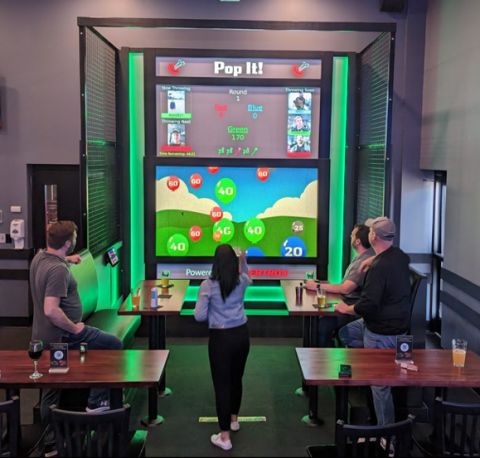
Vol. XXIII, No. 7, July 2023
What are great social gaming experiences?
Thanks to Jim Kessler in his recent newsletter for explaining the type of games required for great social gaming experiences for what the location-based entertainment (LBE) industry is incorrectly calling "Competitive Socializing," which we have more appropriately named "Social Participatory Eatertainment" as this article will explain.
The title of Jim's newsletter is "Social Gaming Wins! Competitive Gaming Loses." You can immediately tell that Jim disagrees with ever using the name Competitive Socializing to describe venues that offer social gaming.
Jim says, "High skill level variance is the number one reason competitive gaming is a loser in an out-of-home social entertainment venue.
"In fact, most Competitive Gaming experiences are the polar opposite of Social Gaming.
"Great Social Gaming experiences are ones where almost everyone can play, almost everyone can have fun play, and almost everyone can eat and drink while playing. Most importantly, our guests can do it all while socializing with their friends, families, coworkers, groups, or fellow guests!"
Jim feels strongly about the success of social gaming venues. He says, "Social Gaming is the 800-pound Gorilla. Most importantly, it's the key to our out-of-home entertainment industry's long-term success."
We have a lot of respect for Jim's thoughts on the industry. He is a very successful owner/operator of two successful location-based entertainment venues and has been a pioneer in introducing concepts to the industry. He's not afraid to experiment with ideas at his venues to learn what really works.
So exactly why don't competitive games work for social venues? Jim explains that high skill level variance is bad. The higher the skill level variance, the less likely a casual player will even try the game. Low skill level games are easy and quick to learn how to play. You can play against another player who already knows how to play with a little practice. You might not win, but you don't feel like they are dramatically better, and you feel like you have a chance to win, especially with just a few more times.
Jim explained that novices face a pretty painful learning curve with high skill level variance games. They will likely get beaten badly by even lower-level players who already know how to play. The bottom line is that high skill level variance gaming experiences can make inexperienced players feel incompetent or even embarrassed due to their lack of ability to play the games.
Jim points out, "If our guests leave our venues feeling incompetent or embarrassed, they will never come back. Even worse, they will tell all their friends, family, and coworkers about their negative experiences.
"The vast majority of our guests don't want to waste their precious out-of-home time and money figuring out how to play a complex game. Their primary goal is to just have fun with their friends, families, coworkers, or groups ."
Jim believes that competitive gaming experiences like eSports or other games with a high skill level variance are doomed to fail and not work long-term in an out-of-home entertainment venue.
Jim isn't lacking in an opinion about VR gaming, "VR gaming has the same complexity issues that most video games have, including the additional complexity of using custom controllers and the necessity of wearing a VR headset. Unfortunately, these headsets hide a player's face from being visible to their friends, family, and coworkers. Just as bad, the players can't see or hear their friends, family, etc., who are watching. When it comes to out-of-home entertainment, VR is literally the polar opposite of what we should be adding to our out-of-home Social Gaming venues." [Also players can't eat or drink while playing]
He also doesn't see pickleball fitting the formula either. "Just one example of skill level variance in pickleball is the ability for skilled players to put a topspin or backspin on the ball, which can cause a novice player to totally miss the ball (i.e., missed ball = embarrassment = negative effect on repeat play = lower future revenue).
"In addition, pickleball takes up a lot of space and can only accommodate two to four players, plus the players can't eat or drink while playing. Even worse, players break a sweat while playing. Sweating and socializing are NOT a winning combination.
"These pickleball issues are not going to lead to an enjoyable out-of-home Social Gaming experience for the vast majority of adults. I'm not saying pickleball is going away, but it's certainly not the best type of gaming experience for an out-of-home social venue."
"The problem with providing gaming experiences for competitive people is that they make up a small percentage of the total population."

Jim introduced a new Social Gaming experience at Bowl Expo from his Lasertron equipment company, Krazy Darts. If you're looking for social gaming experiences, it is worth checking out. Notice that it is designed so players can eat and drink while playing.
In conclusion, we hope the industry will stop using the name Competitive Socializing. As Jim so ably pointed out in his newsletter, competitive gaming is a loser for out-of-home entertainment venues [except for some niche concepts].
Subscribe to monthly Leisure eNewsletter


